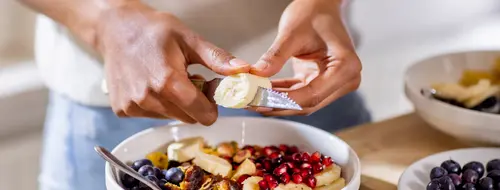When you know the things that can make your IBS symptoms flare up, called triggers, you can make a plan to avoid them. That way, you can work on keeping problems with constipation, diarrhea, belly pain, and bloating to a minimum.
IBS is different for everyone, but it may help to keep track of how you react to the most common symptom triggers and learn to prevent them.
1. Diet Triggers for IBS Constipation
Some foods can make IBS-related constipation worse, including:
- Breads and cereals made with refined (not whole) grains
- Processed foods such as chips and cookies
- Coffee, carbonated drinks, and alcohol
- High-protein diets
- Dairy products, especially cheese
Better Diet Choices for Constipation:
- Gradually boost your fiber intake by 2 to 3 grams per day until you're eating 25 (for women) or 38 (for men) grams per day. Good sources include whole-grain bread and cereals, beans, fruits, and vegetables.
- Eat a moderate amount of foods that are higher in the sugar substitute sorbitol, such as dried plums and prune juice.
- Drink plenty of plain water every day.
Try ground flaxseed. You can sprinkle it on salads and cooked vegetables.
2. Diet Triggers for IBS Diarrhea
Foods that can make IBS-related diarrhea worse for some people include:
- Too much fiber, especially the insoluble kind you get in the skin of fruits and vegetables
- Food and drinks with chocolate, alcohol, caffeine, fructose, or sorbitol
- Carbonated drinks
- Large meals
- Fried and fatty foods
- Dairy products, especially in people who can’t digest the milk sugar lactose, called lactose intolerance
- Foods with wheat for people who are allergic to or have a bad reaction to gluten.
Better Diet Choices for Diarrhea:
- Eat a moderate amount of soluble fiber. It adds bulk to your stools. Good sources are whole wheat breads, oats, barley, brown rice, whole-grain pasta, the flesh of fruit (not the skin), and dried fruits.
- Don't eat foods at opposite temperatures, such as ice-cold water and steaming hot soup, in the same meal.
- Stay away from broccoli, onions, and cabbage. They cause gas, which can make you feel worse.
- Eat smaller portions.
- Drink water an hour before or after meals, not while you eat.
- Talk with your doctor or a dietitian if you think you may have a wheat allergy.
To ease symptoms of bloating and gas, try to avoid gassy foods such as beans, Brussels sprouts, wheat germ, raisins, and celery.
3. Stress and Anxiety Triggers for IBS
Stress and anxiety can make IBS symptoms worse. Worries can come from a lot of sources, including:
- Work
- Your commute
- Problems at home
- Money problems
- A sense that things are out of your control
How to Manage Stress:
- Choose healthy habits. Eat a well-balanced diet that works for your IBS. Get regular exercise and enough sleep.
- Do something fun as often as you can. Listen to music, read, shop, or take a walk.
- Learn better ways to calm down with behavioral therapy. There are a few types: relaxation therapy, biofeedback, hypnotherapy, cognitive behavioral therapy, and psychotherapy.
- If you feel comfortable, talk to family members, close friends, your boss, or co-workers about your IBS. When they know what’s going on, they can support you and better understand how it affects you.
4. Drugs That Can Trigger IBS
Some drugs can trigger constipation or diarrhea. People with IBS may have trouble with:
- Antibiotics
- Some antidepressants
- Medicine made with sorbitol, such as cough syrup
How to Choose Better Meds:
- Talk with your doctor about switching to a drug that won't make your symptoms flare. But ask them before you stop taking your meds.
- Choose antidepressants wisely. Older ones, called tricyclic antidepressants, can cause constipation. Standard ones, called selective serotonin reuptake inhibitors, like fluoxetine (Prozac, Sarafem) and sertraline (Zoloft), can cause diarrhea. Work with your doctor to find the right one.
5. Menstrual Triggers for IBS
Women with IBS tend to have worse symptoms during their periods. There's not a lot you can do to prevent it, but you can ease pain and discomfort during that time of the month.
How to Feel Better:
- Think about taking birth control pills. They can make your periods more regular. But they can cause side effects, like upset stomach, vomiting, stomach cramps or bloating, diarrhea, and constipation. Work with your doctor to find one that works without causing other problems.
- Treat severe PMS. Some drugs that treat depression can help, such as fluoxetine (Prozac, Sarafem), paroxetine (Paxil), and sertraline (Zoloft).
6. Other Triggers
- Eating while you work or drive
- Eating too quickly
- Chewing gum
- Not enough exercise
What to Do:
- Cut out distractions while you eat.
- Try to get at least 30 minutes of exercise each day. It can help you prevent constipation and ease stress.
Also, be sure to talk to your doctor about all your treatment options for IBS with constipation and IBS with diarrhea.

